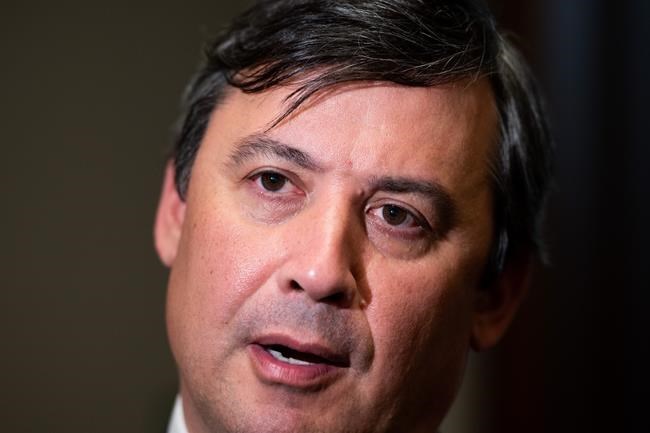WASHINGTON — Conservative MP Michael Chong, the target of an alleged Chinese foreign interference campaign that's become a political migraine for the federal Liberal government, will tell his story Tuesday to lawmakers on Capitol Hill.
Chong is scheduled to appear in D.C. before the Congressional-Executive Commission on China, a bipartisan committee of U.S. senators, members of the House of Representatives and executive-branch emissaries.
Chong's goal is to make clear that his case "is but one case of transnational repression in the People's Republic of China (and) that there are many, many other cases that go unnoticed and unrecorded," he said in an interview.
"Foreign interference is a serious national security threat, not only to Canada, but to other democracies, and we need a suite of measures to counter it — including closer co-operation amongst allied democracies."
Other scheduled witnesses include Yana Gorokhovskaia of the pro-democracy D.C. think tank Freedom House; Laura Harth, the campaign director for the human rights group Safeguard Defenders; and Uyghur activist Rushan Abbas.
Chong said he remains undaunted by the risk that his testimony Tuesday ends up making him an even more prominent target for Beijing, particularly in the U.S.
"They're targeting me because I'm being effective, and so I feel an obligation to continue to speak up, to give voice to the voiceless," he said.
"There are people across the country who have been targeted for years, whose stories go untold and who suffer in silence.... That's what keeps me going."
The commission was established in 2000 as an effort to keep tabs on China's long-decried human rights record, foster development of the rule of law and catalogue the growing list of its political prisoners.
That database includes Michael Kovrig and Michael Spavor, two Canadians who were arrested and detained without cause in China for nearly three years in an apparent act of retaliation for Canada's detention of Huawei executive Meng Wanzhou.
Meng, the chief financial officer and daughter of Huawei founder Ren Zhengfei, was arrested in Vancouver in 2018 on an extradition warrant linked to U.S. Justice Department charges of bank and wire fraud.
In Canada, as in the U.S., it can be difficult to avoid the spectre of partisan politics when talk turns to China and foreign policy, particularly after the COVID-19 pandemic and its impact on global supply chains.
Virtually every domestic policy decision in the U.S. is made within the broader context of ending dependence on Chinese suppliers of raw materials, manufactured goods and high-tech components like computer chips and battery minerals.
North of the border, where the federal government's handling of allegations of Chinese foreign interference has triggered a maelstrom of controversy, a public inquiry is scheduled to begin early next week.
Those allegations came from a series of reports in the Globe and Mail and Global News, which cited anonymous security sources who claim Beijing tried to meddle in the last two federal elections.
Officials say Canada maintained the overall integrity of its federal elections in 2019 and 2021. But opposition parties want clarity on how widespread the interference is and whether the government has adequately protected Canada's democracy.
The Liberal government, Chong said, still hasn't done enough in the wake of the Huawei saga to properly fortify its foreign policy approach to China, even as the U.S. and other democracies adopt a more hawkish stance.
"It doesn't surprise me because I think it is a characteristic of the current government to be slow on implementation," Chong said. "This government can't execute, and so it doesn't surprise me that they are slow on reacting to this threat."
Quebec Court of Appeal Justice Marie-Josée Hogue will lead the 16-month inquiry, which is expected to delve into alleged meddling in Canadian affairs by China, Russia and other foreign states and non-state actors.
An interim report is due by the end of February and a final report by the end of December 2024.
In May, the government confirmed a media report that intelligence officials had detected a Chinese plot in 2021 to intimidate Chong and his relatives in Hong Kong. The Liberal government expelled Chinese diplomat Zhao Wei after sustained uproar in Parliament.
In response, China's embassy expelled Canada's consul in Shanghai and issued a statement accusing Canada of breaching international law and acting based on anti-Chinese sentiment.
Chong's alleged targeting in 2021 came after he successfully sponsored a motion in the House of Commons labelling Beijing's treatment of Uyghur Muslims in China a genocide. But he was never notified of the potential threats, a mistake he has called a "systematic breakdown in the machinery of government."
Former governor general David Johnston was named as a special rapporteur to examine the issue, but he stopped short of recommending a public inquiry, touching off another round of partisan howling.
Before he resigned, saying his probe had become too politically charged, Johnston concluded that the government had not knowingly or negligently failed to act and that Prime Minister Justin Trudeau himself had not been briefed about specific allegations.
Johnston did find, however, a need to implement major improvements to the way government handles sensitive intelligence.
This report by The Canadian Press was first published Sept. 11, 2023.
James McCarten, The Canadian Press

